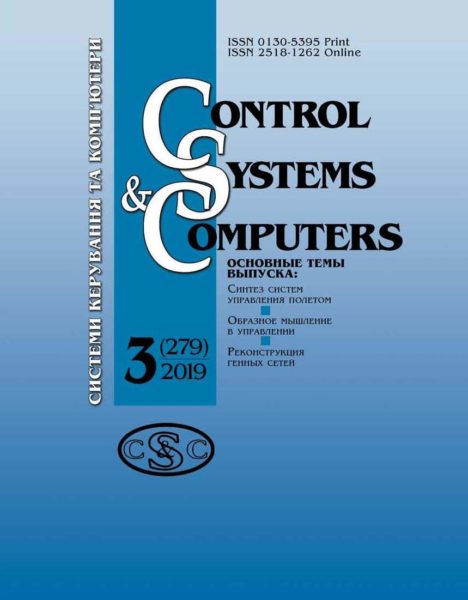Control Systems and Computers, N3, 2017, Article 3
DOI: https://doi.org/10.15407/usim.2017.03.026
Upr. sist. maš., 2017, Issue 3 (269), pp. 26-34.
UDC 681.3.08
Samokhvalov Yuriy Ya., Doctor of Technical Sciences, Professor of the Department of cyber security and information protection of Taras Shevchenko National University of Kyiv, Volodymyrska, 64, E-mail: yu1953@ukr.ua
The Assessment of the Administrative Decisions Validity by Fuzzy Logic
Introduction. The decision is the basis of any control. The validity defines the quality of decisions, and it is impossible to measure it in the process of management. About the quality of the adopted and implemented decisions, validity can be judged only by its consequences. Therefore, a priori assessment of the reasonableness of the solutions is essential.
Purpose. There are several approaches to evaluating the solutions validity: variational, based on the criterion of efficiency, probabilistic and informational. In these methods, the accuracy of the solutions is estimated by the deviations of control parameters from the extreme values inherent in optimal solutions, which leads to a knowledge of this decision and, as a rule, the absence of such knowledge. Besides, when evaluating the solutions reasonableness, the characteristics of the process of their production are taken into account, which does not always provide the reliability of such estimates. In this regard, one possible approach to assessing the validity of decisions is proposed based on the logical-linguistic analysis of the solutions morphology, factors determining the quality and impact of these factors on the decisions validity, that determines its purpose and content.
Methods. The expert assessment and fuzzy logic mechanisms are used.
Results. The term validity is considered as the fuzzy variable with the Zadeh membership function, which connects the decision validity with its rationality. The factors that determine the validity of the decisions are defined. The procedures for quantitative estimation of the truth of these factors and the truthfulness of the solution using the compositional rule of the fuzzy modus ponens are created. The scale of approximation of the quantitative values of the validity of the linguistic modal assessments are designed.
Conclusion. This approach for assessing the validity of administrative decisions does not claim to completeness and is used only to illustrate the application of the fundamental ideas of fuzzy logic for this evaluation. Accounting in this approach, the morphology of the decisions and factors determining their validity, the causal relationships between them and expert judgment allows you to get a final assessment of the reasonableness. The proposed approach can be using as a pilot project for the development of appropriate methods of substantiation of managerial decisions in various fields.
Keywords: administrative decision, quality and validity of decisions, ambiguity, linguistic variable, fuzzy logic, proof.
- Gerasimov, V.M., Samokhvalov, Yu.Ya., 2009. “Methods of assessing the validity of decisions in intelligent systems”. Modern information technologies in the sphere of security and defence, 2(5), pp. 9–12.
- Matveeva, I.G., Yakushev, A.A., 2013. “Theory and practice of modern methods of management decisions”. Economics and modern of management: theory and practice: a collection of stata XXIX Intern. Scientific-practical conference, Novosibirsk: SibAK, 9(29).
- Chagas, A.K., Afanasiev, V.V., 2014. “Assessment of the reasonableness of the decision in the appointment of the impacts of aviation on the enemy objects”. Systems pf information processing, 7(123), pp. 172–174.
- Vasneva, I.V., 2010. “Mathematical models in the quality management system of higher education using the methods of fuzzy logic”, Saratov: Saratov sourse, 187 p.
- Gupanova, Yu.Ye., 2016. “Application of Fuzzy logic in the assessment of the quality of customs services”. Economic analysis: theory and practice, M.: Finances and credit, 1(448), pp. 143–158.
- Lyalkova, Ye.Ye., 2016. “Information sources of management analysis”. Management of economic systems: Electronic scientific journal, Kislovodsk Institute of Economics and Law, 8(90), p. 25.
- Todoran, I.-G., Lecornu, L., Khenchaf, A. et al., 2013. “Information quality evaluation in fusion systems”. Information Fusion, pp. 906–913.
- Kent, S. 1949. Strategic Intelligence for American World Policy. Princeton: Princeton Univ. Press, 226 p.
- Plett, V., 1958. “Information work of strategic intelligence. Basic principles”. Foreign Moscow: Literature Publishing House, 144 p.
- Glushkov, V.M., 1969. “On the prediction based on expert estimates”. Kibernetika, 2, pp. 8–17.
- Samokhvalov, Yu.Ya., 2002. “Harmonization of expert assessments in matrices of reference relations”. Upravlausie sistemy i masiny, 6, pp. 49–53.
Received 07.03.2017



